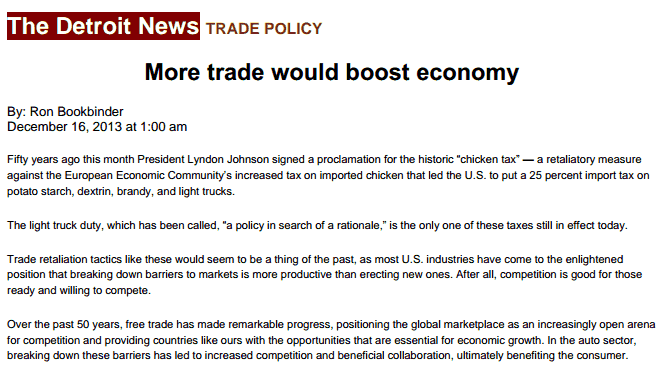The Detroit News – Trade Policy Section
More trade would boost economy
By: Ron Bookbinder
December 16, 2013 at 1:00 am
Fifty years ago this month President Lyndon Johnson signed a proclamation for the historic “chicken tax” — a retaliatory measure against the European Economic Community’s increased tax on imported chicken that led the U.S. to put a 25 percent import tax on potato starch, dextrin, brandy, and light trucks.
The light truck duty, which has been called, “a policy in search of a rationale,” is the only one of these taxes still in effect today.
Trade retaliation tactics like these would seem to be a thing of the past, as most U.S. industries have come to the enlightened position that breaking down barriers to markets is more productive than erecting new ones. After all, competition is good for those ready and willing to compete.
Over the past 50 years, free trade has made remarkable progress, positioning the global marketplace as an increasingly open arena for competition and providing countries like ours with the opportunities that are essential for economic growth. In the auto sector, breaking down these barriers has led to increased competition and beneficial collaboration, ultimately benefiting the consumer.
A wide range of automakers with manufacturing plants in the U.S. are healthier than ever before, providing higher quality vehicles at lower prices with more consumer choice — something that would never have been possible without the challenge of competition.
Considering America’s free trade agreements with 20 countries and its current involvement in the Trans-Pacific Partnership (TPP) negotiations, it’s clear that our nation’s leaders value and want to encourage opportunities for opening markets in the pursuit of economic advancement.
However, there are voices out there asking to turn back the clock. They see trade negotiations as a zero sum game. We must overcome these special interest naysayers who seek to implement a protectionist agenda by introducing poison pills designed to sabotage the TPP. The benefits of a ratified TPP agreement to all 12 countries involved are too great, and the consequences of failure, both economic and strategic, are too disastrous to allow this to happen.
The TPP would encompass nearly 40 percent of global GDP under one free trade agreement. By expanding free trade and open investment in the Asia Pacific region, this agreement will revitalize the global economy.
As the world’s third largest economy, Japan’s participation is essential to the TPP’s success. For example, Japanese automakers have been manufacturing vehicles in the U.S. since the early 1980s, and today are an integral part of the domestic U.S. auto industry. A record 70 percent of the Japanese-brand autos sold in the U.S. are built in North America.
Building and selling them here supported an estimated 1.36 million direct, intermediate and spinoff jobs in the U.S. private sector in 2012. As a result, Japanese-branded auto production and dealer networks in the U.S. contributed to $85 billion in annual compensation for American workers.
After investing $35.4 billion in U.S. manufacturing plants since the 1980s, exports from Japanese auto plants in the U.S. reached a record high in 2012. The TPP will potentially increase exports from the U.S. to other TPP countries, thereby boosting employment and the economy in the U.S.
Given these facts, Japan’s inclusion in the TPP can only increase U.S. economic growth within a strong, mutually beneficial trade agreement.
As many Americans are still feeling the lasting effects of the Great Recession, we must continue down the path of increased trade liberalization to grow and support our economy, strengthen these mutually beneficial relationships, and improve the prospects for more quality American jobs.
Ron Bookbinder is general director of the Japan Automobile Manufacturers Association’s Washington, D.C. office
Original source: The Detroit News
Click to view PDF


